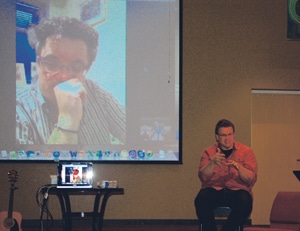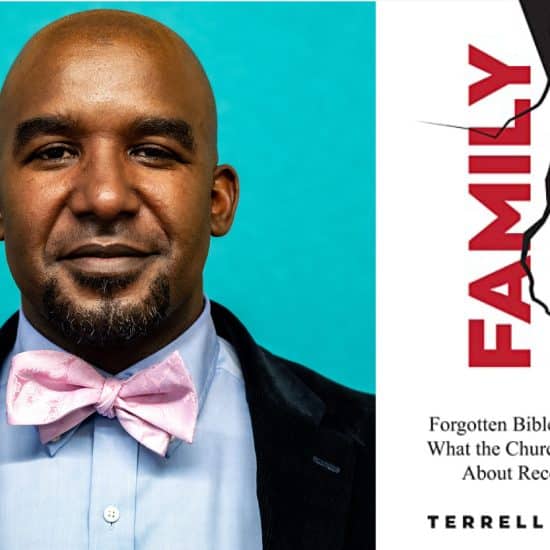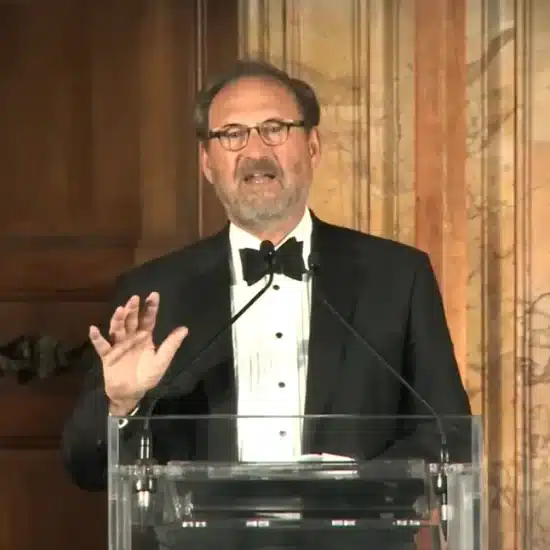JEFFERSON CITY, Mo. — What is happening to Christianity in the United Kingdom is heading to the United States, one British theologian believes. And U.S. Christians can benefit from the lessons the English have learned as they continue to struggle with changes in a post-Christian world.

Malcolm Duncan (on screen), pastor of Gold Hill Baptist Church in Chalfont, St. Peter, England, and Joshua Hedger, director of the Center for Church Planting at Midwestern Baptist Theological Seminary, share at the Reveal Conference in Jefferson City, Mo.
|
Malcolm Duncan, pastor of Gold Hill Baptist Church in Chalfont St. Peter, England, spoke to mid-Missouri pastors and church leaders through video technology as part of the “Reveal: identify, engage, reproduce” conference June 23 in Jefferson City, Mo.
Hosted by Concord Baptist Association at Memorial Baptist Church, the conference drew from the Acts 17 story of Paul’s using the culture of Athens to share the gospel.
Indicators, both outside and inside the church, are revealing the creep of secularization across the British nation. Duncan gave seven signs of secularization he sees outside the church and seven within it.
The theologian cites the rise of a new atheism, changes in accepted morality and a shift away from including religious understanding in education. He pointed out that British society is becoming more multicultural. While he sees the change as “good,” it has led to a struggle among belief systems. While it is unacceptable to make statements about other religious groups, society is now free to marginalize Christianity.
Terms, such as education and family, are being redefined, and people are more suspicious of authority, he added.
Duncan sees growing biblical illiteracy — including among congregational leaders — as the greatest challenge and a key sign of secularization within the church.
The director of Catalyst Mission, an open mission movement across the U.K., told the Missourians another sign of internal secularization is a redefinition of “faithful” and “committed.” Other signs include crises of leadership and of confidence in the church, aggression and attack — the church is known for what it stands against — the splintering of evangelicalism and the confusing of primary and secondary theological issues.
The organized church in the U.K. contributed to the problem, Duncan said, because Christians thought they simply needed to “batten down the hatches.” Instead, they failed to engage the culture. They have lost the difference between the gospel — God reconciling the world through Jesus — and mission or service.
The church has lost its accountability, and it has told outsiders to come in, even though God has commanded believers to go and share the gospel. “People don’t come to church to find God. They come to the church after they find him,” Duncan said.
The church has confused political power with spiritual authenticity, it has chased influence at the expense of authority, and it holds private discussions in public.
Duncan believes the U.S. church can learn seven lessons from U.K. brothers and sisters. The church must seek God instead of trying to organize its way. “We’re not a business, but a family,” he said.
The church must not let culture shape its understanding of Scripture and must engage the culture distinctively. It must recognize the age of denominationalism is dying and must refuse to compromise on the important issues. It also must learn to take risks.
Today’s church must not compromise on the gospel. Instead, it must guard the gospel and pass it to the next generation. “We must be a gospel people who plant gospel churches,” he said.
Joshua Hedger, director of the Center for Church Planting at Midwestern Baptist Theological Seminary, spoke on reaching younger generations through cultural engagement, relevancy and authenticity.
He emphasized that while congregations must be different in each locality, foundations for church planting apply to all.
The American church is substituting social justice for the gospel, Hedger said. Instead, believers must learn a new language and a new missiology to reach younger generations.






